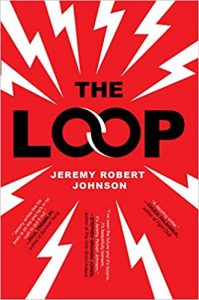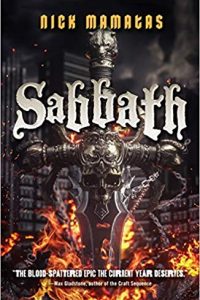Katharine Coldiron Reviews The Loop by Jeremy Robert Johnson
 The Loop, Jeremy Robert Johnson (Saga 978-1-53445-429-3, $26.99, 320pp, hc) September 2020.
The Loop, Jeremy Robert Johnson (Saga 978-1-53445-429-3, $26.99, 320pp, hc) September 2020.
There’s something to be said for a story that jams its foot on the accelerator and leaves it there for 300 pages, an engine that runs at 5,000 RPM for the entire length of a narrative, pushing on until it has spent itself completely. That’s the kind of book Jeremy Robert Johnson’s The Loop is: a sprinting, throbbing horror novel with hardly a pause for breath. Complex story patterns and narrative trickery are all well and good, but they might whet even a sophisticated audience’s appetite for something as pure and adrenaline-driven as Mad Max: Fury Road. With his second novel, Jeremy Robert Johnson delivers exactly that.
Lucy Henderson is one of a tiny handful of non-white kids in Turner Falls OR, a suffocating small town financially dependent on a few factories and IMTECH, a new biotech concern. The politics of a place like this are familiar: the rich kids do whatever they want without consequence, while the poor kids retreat into drugs and alienation. These class issues make The Loop a more complex novel than it appears to be. Johnson’s insight on the menace of privileged white boys of high school age – often dismissed as simply obnoxious – is profound, and it underlies the terror wreaked on the town. Lucy specifies:
An ever-worsening, ever-more-chaotic batch of kids drinking themselves into grunting animal states… All of them acting like everything was great in the midst of everything wrong – smoke and sirens and shots fired, their peers dead or missing or worse – doing their best not to think about a single damn thing, chasing escape through doors leading nowhere.
Teens are dead and missing by way of Oracle, a software implant that causes young people in Turner Falls to enact feral violence on each other and, later, the rest of the town. They murder bloodily, indiscriminately, in response to a media signal (comparable to a wifi or television signal) that starves them of positive brain chemicals until they kill again. It wasn’t supposed to go this way: the implant was rushed into human experiments without being vetted properly, and a psychopathic test subject has unintentionally rewritten its code. This reprogramming combines with overactive biological components to create little black creatures that nest on subjects’ necks, embed inside their brains, and reproduce rapidly. Lucy and a shrinking group of her outcast friends are the only hope for the town and, perhaps, the human race.
Along with being a fine horror novel in its own right, the book contains an interesting parallel between the fictional biotech experiments and the very real phenomenon of school shootings: “There was the world behind them, and the world ahead of them, and all of it wanted them dead. Finally having that at the surface felt right to Lucy.” The kids rendered murderers by Oracle echo vulnerable teenagers losing themselves to toxic websites in the real world. Any ideology that will validate their pain, even if it’s an extremist one, can get inside their heads and wreak violence there. In the novel, Lucy, instead of hiding mutely or giving in to the TV broadcasts IMTECH uses to hypnotize the adults of the town, seizes her power to fight against the infected teens who want to kill her. It’s a bit of a fantasy, Lucy’s extraordinary capacity to rise up against what harms her instead of wallowing in PTSD, but likely a helpful one for kids who have lived through less supernatural horrors. “She thought of the feeling of violence in her bones, and the uncontrollable destructive momentum of the new Lucy who’d been born inside the Oracle’s nightmare version of her home.”
One major flaw in The Loop is the clarity of its plot. Violence multiplies long before the reader has any idea why the town’s teenagers are acting different, and Oracle doesn’t even have a name until over halfway through the book. Johnson seeds clues to the plot in transcripts of the Nightwatch, a conspiracy-mongering podcast that catches on to the dangers in Turner Falls before anyone else does, but how it all hangs together doesn’t become clear until too late in the book. Some aspects never become clear; the actual intended purpose of Oracle remains fuzzy, and the exact nature of the loop of the title is murkier than it ought to be, given that it’s the title.
However, Johnson has traded clarity for a cracking read, a rewarding choice. The Loop is a remarkably propulsive novel, cinematic in the best way, with perfectly tuned tension and excellent character choices. Sometimes the prose leans toward melodrama (“their shared nightmare coalesced as they drove the streets of Turner Falls in search of anything that might return them to the world they once knew”), but that, too, is effective. The underlying critiques of small-town class strata and the violent world in which today’s teenagers are forced to grow up do not detract from the novel’s momentum, and make it an unexpectedly rich read. For all its visceral horror and its proper but unhappy ending, The Loop is a headlong, straightforward pleasure.
Katharine Coldiron is the author of Ceremonials (Kernpunkt Press), an SPD fiction bestseller. Her work as a book critic has appeared in The Washington Post, The Believer, The Guardian, and many other places. She lives in California and at kcoldiron.com.
This review and more like it in the October 2020 issue of Locus.
 While you are here, please take a moment to support Locus with a one-time or recurring donation. We rely on reader donations to keep the magazine and site going, and would like to keep the site paywall free, but WE NEED YOUR FINANCIAL SUPPORT to continue quality coverage of the science fiction and fantasy field.
While you are here, please take a moment to support Locus with a one-time or recurring donation. We rely on reader donations to keep the magazine and site going, and would like to keep the site paywall free, but WE NEED YOUR FINANCIAL SUPPORT to continue quality coverage of the science fiction and fantasy field.
©Locus Magazine. Copyrighted material may not be republished without permission of LSFF.







